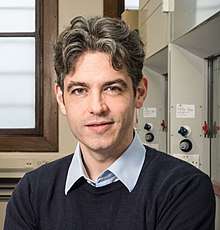Leroy Cronin
Leroy "Lee" Cronin (born 1 June 1973)[1][4] is the Regius Chair of Chemistry in the School of Chemistry at the University of Glasgow, UK.[5][6][7] He was elected to the Fellowship of the Royal Society of Edinburgh, the Royal Society of Chemistry, and appointed to the Regius Chair of Chemistry in 2013 (He was previously the Gardiner Chair, appointed April 2009).
Leroy Cronin | |
|---|---|
 Cronin in 2015 | |
| Born | 1 June 1973[1] |
| Nationality | British |
| Alma mater | University of York |
| Known for | Chemistry, Digital Chemistry, Nanoscience,[2] Self Assembly, Nanotechnology, Polyoxometalates,[3] Supramolecular chemistry, Self-organization, 3D printing |
| Awards | Philip Leverhulme Prize; Corday-Morgan Prize; RSE BP Hutton Prize; Tilden Prize |
| Scientific career | |
| Fields | Chemistry, Nanoscience, Self Assembly, Systems chemistry, Complex Chemical Systems, Inorganic Biology, Supramolecular chemistry, Self-organization, 3D printing |
| Institutions | University of Glasgow University of Birmingham Research Institute for Electronic Science, University of Hokkaido University of Bielefeld University of Edinburgh |
| Doctoral advisor | Paul. H. Walton |
Biography
Lee Cronin[1] received his B.Sc. (1994) and Ph.D. (1997) degrees from the University of York. From 1997 to 1999, he was a Leverhulme fellow at the University of Edinburgh working with Neil Robertson, and after that he moved to the University of Bielefeld (1999–2000) as an Alexander von Humboldt research fellow in the laboratory of Achim Mueller. In 2000 he joined the academic staff at the University of Birmingham, UK, as a Lecturer in Chemistry, and in 2002 he moved to a similar position at the University of Glasgow, UK.
He became Reader at the University of Glasgow in 2005, EPSRC Advanced Fellow and Professor of Chemistry in 2006, and in 2009 became the Gardiner Professor. In 2013 he became the Regius Professor of Chemistry (Glasgow).
Cronin gave the opening lecture at TEDGlobal conference in 2011 in Edinburgh.[8] He outlined initial steps his team at University of Glasgow is taking to create inorganic biology, life composed of non-carbon-based material.
He was awarded a Philip Leverhulme Prize by the Leverhulme Trust in 2007.[9] He was awarded the Corday-Morgan medal of the Royal Society of Chemistry in 2012.[10]
Lee Cronin was the subject of a film entitled Inorganica, which documents the progress of his research in inorganic biology and origins of life.[11]
In 2014 Lee Cronin was recognised as one of the UK’s top 10 Inspiring Sciences and Engineers (RISE)[12] as well as being recognised as one of the top 100 UK practising Sciences by the UK Science Council[13]
In 2015 Lee Cronin gave the Royal Society of Edinburgh BP / Hutton Prize for Energy[14] innovation and also was named winner of the Tilden Prize of the Royal Society of Chemistry in 2015.[15]
Cronin has published over 380 papers,[16] given 350 lectures. He runs a large research group[17] and holds EPSRC Programme, Platform Grants and was awarded a European Research Council (ERC) Advanced Grant.
References
- "Cronin, Leroy (Lee)". Who's Who. ukwhoswho.com. 2015 (online Oxford University Press ed.). A & C Black, an imprint of Bloomsbury Publishing plc. (subscription or UK public library membership required) (subscription required)
- Design and fabrication of memory devices based on nanoscale polyoxometalate clusters C. Busche, L. Vila-Nadal, J. Yan, H. N. Miras, D.-L. Long, V. P. Georgiev, A. Asenov, R. H. Pedersen, N. Gadegaard, M. M. Mirza, D. J. Paul, J. M. Poblet, L. Cronin, Nature , 2014 , 515 , 545-549.
- Decoupled catalytic hydrogen evolution from a molecular metal oxide redox mediator in water splitting B. Rausch, M. D. Symes, G. Chisholm, L. Cronin, Science, 2014, 345, 1326-1330.
- "Archived copy". Archived from the original on 24 September 2011. Retrieved 10 September 2011.CS1 maint: archived copy as title (link) Cronin CV
- "Prof Leroy Cronin". University of Glasgow. Retrieved 20 February 2011.
- "University of Glasgow News Review: Tiny molecule is 10,000 times thinner than a single hair".
- http://news.bbc.co.uk/1/hi/scotland/4573117.stm Chips squeezed by nanoscale work
- "Making matter come alive".
- "Philip Leverhulme Prize Prizes" (PDF). Leverhulme Trust. Retrieved 28 July 2012.
- "Corday-Morgan Prizes". Royal Society of Chemistry. Retrieved 20 June 2012.
- "Inorganica".
- "Leroy (Lee) Cronin - EPSRC website". www.epsrc.ac.uk.
- http://www.sciencecouncil.org/content/2014-list-leading-uk-practising-scientists%20
- "Home - The Royal Society of Edinburgh". The Royal Society of Edinburgh.
- "Tilden Prize". Royal Society of Chemistry. Retrieved 23 November 2015.
- "Leroy Cronin B-7752-2008 - ResearcherID.com". www.researcherid.com.
- "Main Page". www.croninlab.com.
External links
- The Cronin Group
- Cronin biography
- Leroy Cronin at TED

- Lee Cronin: Making matter come alive, a TED talk (TEDGlobal 2011)]
- Lee Cronin: Print your own medicine, a TED talk (TEDGlobal 2012)]